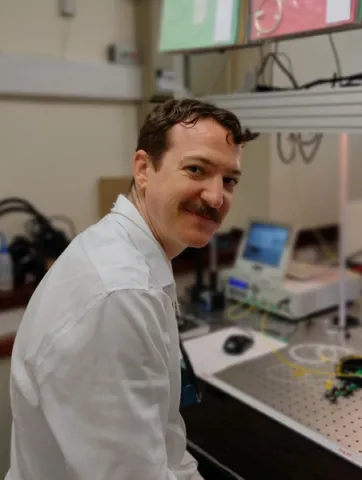About the project
Hollow core fibres are transforming applications in communications, sensing, and high-power laser delivery. The aim of this project is to study the fundamental reactions that control the stability and lifetime of these novel fibres which guide light through a gas-filled core instead of solid glass.
The unique design of hollow core fibres allows light to propagate in a gas channel surrounded by a thin silica structure, where trace impurities in the glass network can react with moisture from the environment. These surface reactions can generate gaseous species within the fibre, influencing its optical transmission and long-term reliability, particularly in systems exposed to ultraviolet light or radiation.
In this project, you will investigate the surface chemistry, gas diffusion, and reaction kinetics occurring within hollow-core fibres. You will develop novel optical interrogation techniques to probe characteristic absorption features of gases such as water vapour and other reaction products along the fibre length. This will enable the first in-situ mapping of length-resolved chemical processes inside optical fibres.
Complementary temperature-dependent studies will reveal how environmental factors affect reaction rates and the evolution of gases within the fibre. The insights gained will contribute to developing methods for preventing unwanted reactions in hollow core fibres and for conditioning fibres to enhance their performance and stability in demanding applications. This project is highly relevant to the wider telecommunications and photonics industries.
The Optoelectronics Research Centre (ORC) provides exceptional laboratory facilities, including cleanrooms, advanced optical testing systems, and gas-analysis tools. You will gain expertise in:
- fibre optics and laser-based diagnostics
- surface and gas-phase reaction analysis
- optical and thermal characterisation methods
- interdisciplinary research across photonics, chemistry, and materials science
The School of Optoelectronics (ORC) is committed to promoting equality, diversity inclusivity as demonstrated by our Athena SWAN award. We welcome all applicants regardless of their gender, ethnicity, disability, sexual orientation or age, and will give full consideration to applicants seeking flexible working patterns and those who have taken a career break. The University has a generous maternity policy, onsite childcare facilities, and offers a range of benefits to help ensure employees’ well-being and work-life balance. The University of Southampton is committed to sustainability and has been awarded the Platinum EcoAward.

